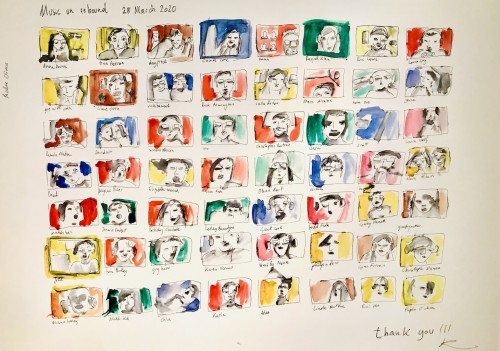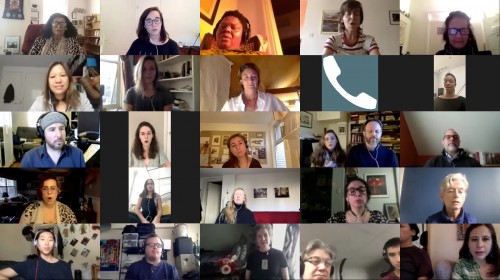![]()
 Contrast these two scenarios: the time is spring 1979, and I have gathered with several others at the Music Gallery’s original location on St. Patrick Street to hear a concert of music by Pauline Oliveros – or at least that’s what I was expecting. Instead, rather than sitting and listening to Oliveros perform solo, those who attended were invited as a group to create a performance of one of her Sonic Meditations entitled Tuning Meditation. Laying on the floor with our heads together, we listened intently for a tone inside us that wanted to be heard, and then sang it on the exhale of one breath. Next, we listened to the sounds around us and on the next exhalation, we repeated, or tuned ourselves to, a tone we could hear coming from someone else in the room. The Tuning Meditation unfolded in its own timing, with everyone alternating between these two ways of listening – first to ourselves internally and then externally in the space of the room, always sounding one tone on each exhalation.
Contrast these two scenarios: the time is spring 1979, and I have gathered with several others at the Music Gallery’s original location on St. Patrick Street to hear a concert of music by Pauline Oliveros – or at least that’s what I was expecting. Instead, rather than sitting and listening to Oliveros perform solo, those who attended were invited as a group to create a performance of one of her Sonic Meditations entitled Tuning Meditation. Laying on the floor with our heads together, we listened intently for a tone inside us that wanted to be heard, and then sang it on the exhale of one breath. Next, we listened to the sounds around us and on the next exhalation, we repeated, or tuned ourselves to, a tone we could hear coming from someone else in the room. The Tuning Meditation unfolded in its own timing, with everyone alternating between these two ways of listening – first to ourselves internally and then externally in the space of the room, always sounding one tone on each exhalation.
Now jump ahead 41 years to April 2020, when I along with almost everyone else in the world am facing a pandemic that requires many of us to self-isolate. I come to my computer with my earbuds in and click on a Zoom link for a video call that I’ve registered for, called “The World Wide Tuning Meditation.”
I am ushered into the waiting area of an online space where a recording of the previous week’s performance of the World Wide Tuning Meditation can be heard. Slides with different quotes from Oliveros’s writings can be seen, such as this one: “Listening is directing attention to what is heard, gathering meaning, interpreting and deciding on action. Call it listening out loud.” After opening remarks from two of the event organizers, Raquel Klein and Claire Chase, Ione, the spouse of the late Oliveros, appears on the screen and goes through the instructions for Oliveros’s Tuning Meditation – a process we are all about to participate in online.
After an inaugural online session on March 28, 2020, the World Wide Tuning Meditation – a video call version of Oliveros’s piece – ran weekly until April 25, 2020, with a cumulative total of over 4,600 participants coming from 30+ countries and all seven continents. I joined in a number of these meetings over the course of the month.
Having participated in this Tuning Meditation myself innumerable times over the years, this online version had some unique qualities because of the medium. Visually – just as drawings that document the project illustrate – everyone appeared in squares. One could scroll through the various pages of the Zoom video call to see who was present, and of course the chat window was abuzz with comments and people saying hello. One week I had the unusual experience of having a close musician friend appear on my screen repeatedly and it felt like I was sounding directly with her, regardless of whether what I was hearing was actually her or not.
 The challenges of listening to a large digital field of hundreds of people via their computers were definitely unique. The sonic field contained various digital artifacts, and the airy background sounds picked up by all of our computers were interwoven with all of the vocal tones we produced. Listening for a sound to make that would be a new offering to this already-busy collective field required deep internal focus – and finding a sound to tune with was fleeting, as the technology made its own decisions as to what would be audible on my end. I would hear a tone, decide to tune with that sound, and then it would be cut off. However, this experience also created the sensation that my action of repetition enabled one person’s sound to have a more extended presence than perhaps it would have if we had been in a physical room together.
The challenges of listening to a large digital field of hundreds of people via their computers were definitely unique. The sonic field contained various digital artifacts, and the airy background sounds picked up by all of our computers were interwoven with all of the vocal tones we produced. Listening for a sound to make that would be a new offering to this already-busy collective field required deep internal focus – and finding a sound to tune with was fleeting, as the technology made its own decisions as to what would be audible on my end. I would hear a tone, decide to tune with that sound, and then it would be cut off. However, this experience also created the sensation that my action of repetition enabled one person’s sound to have a more extended presence than perhaps it would have if we had been in a physical room together.
During one meeting on April 11, a simultaneous broadcast on YouTube was set up, which fed the live sound directly into a special cistern reverberation app that extended the collective sound into a beautiful resonant series of tones. The same reverb effect has been added to all of the recordings of the project, thanks to co-organizer Ross Karre.
The idea to create such an experience originated with Raquel Klein, founder and producer of Music on the Rebound, an online festival designed to bring people together through musical exchanges and help performers affected by the COVID-19 crisis. To get the World Wide Tuning Meditation plan on its feet, Klein reached out to Claire Chase, flutist and member of the International Contemporary Ensemble (ICE), who in turn connected with Ione to make everything happen. Other members of ICE have also been active in the project, hosting Zoom calls and sorting out other logistics. As co-organizer Bridgid Bergin stated in an email exchange with me: “These events have provided a space for healing during such an overwhelming and difficult time. For 30 minutes we have the chance to listen and resonate with our bodies, and connect with people from all around the world – technical glitches and all!”
During Claire Chase’s opening remarks for the final Tuning Meditation on April 25, she reminded us that for Pauline Oliveros, “hearing the spaces in which we listen are as important as the sounds we make. Oliveros once dreamed about the ability to sound and perceive the far reaches of the universe, much as whales sound and perceive the vastness of the oceans.” Added to that was Ione’s statement that “it was a vision of Pauline’s to have a tuning experience that moved around the world.” In a sense, that time has arrived – and although these weekly gatherings have ended for now, the organizers promise that more is yet to come.
The World Wide Tuning Meditation (presented by Music on the Rebound in collaboration with Ione, Bridgid Bergin, Larry Blumenfeld, Claire Chase, Boo Froebel, Ross Karre, Erica Zielinksi, and the International Contemporary Ensemble) ran weekly from March 28, 2020 to April 25, 2020 via Zoom. More information about the project can be found here. A recording of the April 25 session is available on YouTube here.
Wendalyn Bartley is a Toronto-based composer and electro-vocal sound artist. sounddreaming@gmail.com.



